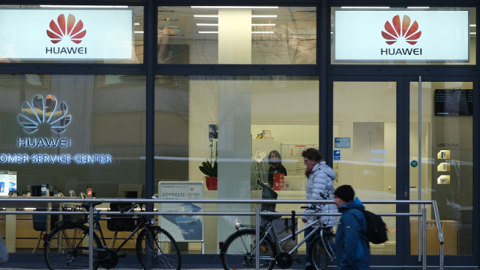Reports last week that Berlin refused to ban Huawei from Germany’s 5G internet infrastructure appeared to mark a loss for the Trump administration’s efforts to combat the growing influence of China’s tech giant. However, U.S. Ambassador Richard Grenell wasted no time in kicking off a new round of the fight. Grenell warned Berlin that the United States might withhold intelligence cooperation from Germany if Huawei isn’t banned. German Chancellor Angela Merkel’s next move will affect not just the transatlantic relationship, but the future of Germany’s economy.
The December arrest of Meng Wanzhuo, Huawei’s chief financial officer and the daughter of its founder, shone a spotlight on the quiet American diplomatic effort to put a stop to the Chinese company’s global ambitions. Huawei is a frontrunner in the race for high-speed 5G internet networks and is under intense scrutiny from the United States. Not only has an alleged violation of Iran sanctions landed Meng in legal peril, Huawei is in court for allegedly stealing information about T-Mobile’s robotics. In addition to its legal campaign against Huawei, the United States is discouraging its allies from allowing the company to build 5G networks because of national security concerns stemming from Huawei’s close relationship with its home government.
U.S. allies across the Pacific have sprung into action to block Huawei’s access to their 5G networks, but the Europeans are dragging their feet. The United Kingdom, whose intelligence services operate a lab to test Huawei’s products, claims that it has found little evidence of “back doors” that would grant access to Chinese intelligence services. What it has found is shoddy coding that introduces vulnerabilities to such an extent that British intelligence admits to “only limited assurance” that Huawei does not threaten British national security. Despite the risk, the National Cyber Security Centre has not recommended a ban in the United Kingdom.
Germany shows similar reticence to lock out Huawei, which has tried to placate regulators by opening a cybersecurity lab for the Germans that is modeled on the British one. The chancellery plans to require components of future network infrastructure to undergo testing in similar labs before installation.
This may be asking too much of German regulators. It is unclear whether German inspectors can attain certainty about Huawei’s activities where the British have not. And the head of Germany’s Federal Office for Information Security, the agency that will lead this testing, did not inspire confidence by endorsing a “no spy” agreement with Beijing that bears a dismaying resemblance to a 2015 U.S.-China agreement that is widely regarded as a failure.
The debate about Huawei is often depicted as pitting economics against national security concerns, but that frame is becoming less helpful as Germany awakens and reacts to the extent of China’s economic ambitions. German economic minister Peter Altmaier and his French counterpart have called for a new industrial policy to protect strategic high-tech industries from foreign competitors. Their manifesto should engender political support: Annegret Kramp-Karrenbauer, the new leader of Germany’s Christian Democrats, said a few days earlier that “we certainly need some kind of strategic industrial policy” to manage China’s challenge to Germany’s economic and social system. It is difficult to imagine an industrial policy for the high-tech sector that does not include 5G.
The stakes are high because 5G policy is not merely about the esoteric details of making the internet faster. It touches directly on the future of the German auto industry – the heart of its economy. The automotive industry, which directly or indirectly accounts for one out of every seven German jobs, must keep pace in the development of electric and autonomous vehicles for the German economy to successfully adapt to the advent of electric vehicles, which will be challenging enough as it is.
Huawei’s entry into Germany will threaten this development. Autonomous vehicles require massive amounts of data exchange, which in turn requires 5G or similar high-speed wireless internet technology. Inserting Huawei into the middle of this exchange will give it access to staggering amounts of information about Germany’s self-driving cars as their manufacturers roll them out. Given Huawei’s history of intellectual property theft, it is reasonable to assume that the tech giant may find another use for that data. In the near future, German car manufacturers might find themselves competing against Chinese rivals sporting copies of their own technology.
Huawei’s entry could threaten not only German national security, but the future of the German manufacturing economy. German monitoring may be enough to forestall a catastrophe. The question is how willing Merkel is to bet on it.


















